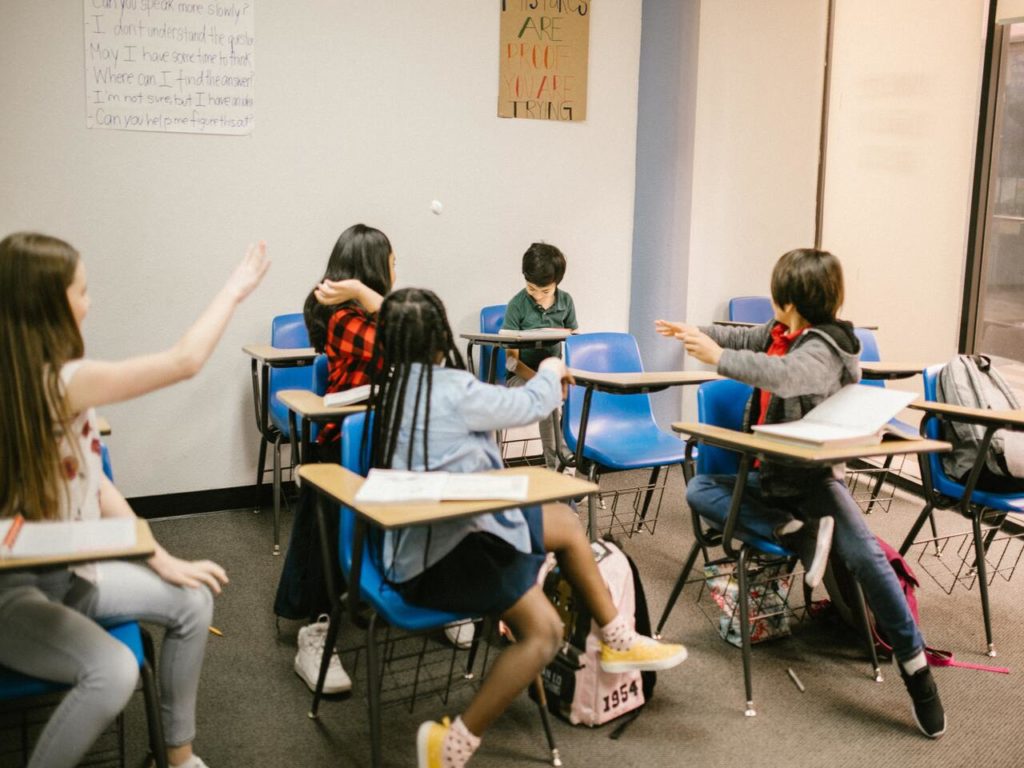Bibliothèque publique d’information – notre réponse actualisée le 20/07/2021.

« Au total, 700 000 élèves sont ainsi harcelés chaque année, avec des conséquences plus ou moins graves. Alors que certains se trouvent peu à peu en échec scolaire, d’autres souffrent de traumatismes plus profonds (angoisse, dépression, troubles du sommeil, etc.) pouvant les conduire jusqu’au suicide. »
Harcèlement scolaire : chiffres, causes et conséquences par Dorothee Thierry, Observatoire Santé, 2020.
Face à ces chiffres inquiétants, quels sont les livres qui abordent le sujet du harcèlement scolaire d’un point de vue sociologique ?
Les violences dans le milieu scolaire
Le harcèlement au collège : les différentes faces de la violence scolaire
Dominique-Mauela Pestana, Éditions Karthala, 2013.
Résumé :
« Enquête sur les violences en milieu scolaire et notamment sur le phénomène croissant de harcèlement entre élèves. L’ouvrage s’appuie sur des témoignages et des sondages émanant de collèges pour comprendre comment la violence scolaire s’est accrue, stigmatisée et diversifiée dans ses formes. Il analyse également l’impact sur les adolescents et les moyens de lutter contre. »
L’élève humilié : l’école, un espace de non-droit ?
Pierre Merle, Presses universitaires de France, 2012.
Résumé :
« Analyse les pratiques d’humiliation en milieu scolaire en pointant leur rôle dans la reproduction des positions sociales. Elargit cette étude de la dévalorisation publique de l’élève en examinant le décalage entre les textes qui régissent les droits des élèves et leur mise en oeuvre dans les établissements. »
Psychopathologie de la scolarité : de la maternelle à l’université
Nicole Catheline, Elsevier-Masson, 2012.
Résumé :
« Ce livre est centré sur la question de l’impact de la scolarisation sur le développement de l’enfant à chacune des étapes de la croissance. Il aborde tous les âges de la scolarité par ordre chronologique, depuis la maternelle jusqu’aux trois premières années de faculté. Cette édition traite du harcèlement en milieu scolaire et fait le bilan de la loi de 2005 sur la scolarisation des handicapés. »
Harcèlement scolaire : le comprendre pour le prévenir
Harcèlement scolaire : de la destruction à la reconstruction
Noémya Grohan, J.Lyon, 2019.
Résumé :
« Des conseils pour guérir des séquelles causées par le harcèlement scolaire. Avec le témoignage d’une ancienne victime devenue présidente de l’association Génér’action Solidaire. »
Le harcèlement scolaire
Nicole Catheline, PUF, 2015.
Résumé :
« Récemment pris en compte par les pouvoirs publics, le harcèlement à l’école est présenté ici comme un échec de la dynamique de groupe. La pédopsychiatre, qui s’appuie sur de nombreux cas cliniques, propose des pistes pour y remédier aussi bien par l’incitation au respect mutuel que par des formes d’enseignement ou des modèles de coopération entre adultes, enseignants ou parents. »
Harcelé-harceleur : une histoire de souffrance et de silence
Hélène Molière, J.C Lattès, 2015.
Résumé :
« La psychothérapeute pour enfants décrypte la violence entre les élèves et donne les clés aux parents pour mieux protéger leurs enfants. »
Harcèlement et cyber-harcèlement à l’école : une souffrance scolaire 2.0
Jean-Pierre Bellon et Bertrand Gardette, ESF éditeur, 2013.
Résumé :
« Les auteurs font le point sur les connaissances actuelles en matière de harcèlement et de cyber-harcèlement, avant d’examiner l’ensemble des difficultés que posent aux éducateurs ces nouvelles formes de violence. Ils proposent différentes pistes de prévention qui peuvent être mises en oeuvre. »
Harcèlement et brimades entre élèves : la face cachée de la violence scolaire
Jean-Pierre Bellon et Bertrand Gardette, Éditions Fabert, 2010.
Résumé :
« Présentation et analyse du harcèlement en milieu scolaire en France. Les élèves expliquent ce qui distingue ce type de violence des autres. De nombreux témoignages de victimes, harceleurs, parents et témoins apportent un éclairage à ce phénomène et permettent d’envisager des solutions de prévention. »


